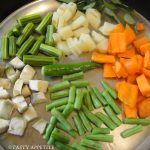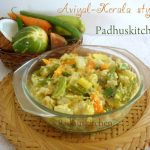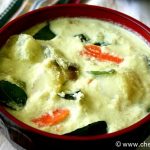Do you like our ‘avial’ ? Each ‘ kashnam ‘ piece of vegetable, maintains its identity . Despite their difference , when avial is served, it adds fragrance to the food and tickles our taste buds.
I used to dislike our ‘avial’ Iyer ‘bhasha’ as a student in the midst of Malyalam- speaking friends but now, I feel that it has a unique flavor of its own.
‘En vayatherichalai enthukku ippadi kottikkarael ? ‘Ammalu’s complaint to me. In Malayalam, the same love-bashing will be, “‘enthina ennae inganae upadravikkunnathu ?’
Meaning almost the same, but the emphasis differs .
Where is the anaemic ‘ upadravikkunathu’ before the majestic ‘vayatherichal kottikarael ?
When I went to Thiruvanathapuram for my wedding, I was irritated by the way the children there, were addressing me as ‘Oi’ often. I wanted to pinch their ears, privately, as a bridegroom is not expected to that publicly.
‘I don’t like this ‘Oi’ and ‘pai’,’ I told my dad.
‘Vaayai moodikkindu irum, Oi,’ said my dad. Keep your mouth shut, Oi’!
I also wanted to punch the belly of an elderly relative from Momkombu, when he abused me for my ‘meesai’ moustache, calling me kazhuveridamon’. ‘Anthakazhuverida monte meesayum avanum’,
this was how he complimented me, at my back, when I was leaving him, after taking his blessings.
‘Kazuveride mon’ is a bad word. But it was not so for that Monkombu vaadyar and other elders, I was told. My father- in- law used to talk to me mostly in Malyalam. ‘Edo thante Rudram ennae virappitchu- I shivered in fear hearing your Rudram-‘, he told me, after hearing my Rudram Japam in the Sreekanteswarm temple.
Iyer families in Vaikom and Thiruvanthapuram had a sightly variant dialect those days. Some of their food items also had variance. For eg. ‘Maalaadu’ was one of their favorite sweet items, which I had not enjoyed till my marriage day.(On wedding-day anything will be enjoyable,maalaadu or paalaadu and that is another issue) .
Kappai pappadam, I had never seen before; now I bring them in tons to US. The very word ‘Kappai’ I used to dislike as it rhymes with ‘kuppai’ trash! Now, as I love Kappai pappadam being introduced to by my mamiyar, MIL, I rhyme it with ‘Suppai’
how my ThAtha Subramania Iyer was called by the then Raja of Palakkad. Let both the good souls rest in peace. Raja because he gave a free shelter in his ‘idam- home’ for ThAtha, where I was born and ‘Suppai’ ThAtha as he used to bring Neiyyappam from HemAmbika temple, where he was a manager. I never had such a tasty appam from anywhere in the country.
”Ponna poranthavall ellam sappida okkarungo ‘ My wife’s Chellamma athai, whom I have immortalized in my Pitchumani story used to invite the women folk of the family for food. In Palakkad we don’t call them ‘ponna poranthava or born as women!’
I am for preserving our unique identities such as our own dialects, dress habits, Chandana kuri, the two-inch-long sandal paste mark on the forehead, our Malayalam -mixed Tamil dialect etc as such. The present generation born in 1 BHK or 2 BHK flats in towns and cities would have hardly heard words like thinnai, kootam and kottukoodams of our old houses. Our sons and daughters are choosing their partners speaking different languages. So the children in future will be talking language different from what our parents or even we, spoke or are speaking. I’m not able to follow the English accent of my grand children.
Avaniavittam, during my childhood was great occasion for us. My sons might remember that word. My grandson will have to refer dictionary to know what it is!
So let us enjoy the treasure handed over to us by our forbears.



The Palakkad Tamizh has a flavour of its own!
I remember very clearly and graphically how after getting married my dear husband took me to the Bombay flat in Mulund West that he found with great difficulty(Bhageeratha Prayathnam) after searching for 9 months! There was a beautiful, auspicious, welcoming ‘kolam’ at the ‘vashapadi’ painstakingly and lovingly put by our immediate ‘asalathskaara’Mami whose name was Padma Sankaran. She had also lent us her stove for the shubha ‘ boiling milk’ ritual-Paalkaacharudu!However, just as I stepped into the house I saw a big Bombay cockroach and froze. Looking at my handsome husband I asked him for a ‘choolu’. He looked at me with his exceptionally large and innocent eyes and didn’t know what I was telling him. I repeated ‘choolu venam’ but it went over his head!
And it was only later I learnt that our ‘choolu’is their’ thodappum’. And so we used to make fun of each other and learn from each other. Those were lovely days – Paramasukham!
As the blog author writes change is taking place at a great pace. Our children are moving away from home and marrying outside our own circle and with this the ‘old order changeth yielding place to new ‘. There is a tinge of sadness for the loss of our inheritance – our legacy but this has always been happening and will go on……. so we of the old school should just share our inherited joys! Namaskarams to you Mama. Just for clarification, though my maternal Paati was fromTrichur and Paata was from Kalpathy graamam, I have never visited those hallowed places. Was born in the North of Bharatavarsham but learnt Palakkad Tamizh from those great souls! My father was from the North but due to the presence of my grandparents,mother and Periyamma I learnt the language and that is how the connection is still alive!Today thinking back I really feel it is a wonder of wonders! Namaskarams!
Thanks Vijaya madam. Sharing your comments with my face book friends with this introduction :
‘Smt. Vijayaa 108, commenting on my blog, ‘Avilal, Avaniavittam and others’:
Many may have similar experience.
‘Amma, poochai’ alerted the daughter in law of Palakkad origin, seeing a cat entering the kitchen.
‘Athena, poochai, eachai ! Poonainnu sollu’
Corrected the mother in law from Tanjore.
Dialects differ even within the same state but of different parts. Palakkad Malayalam is not the same as Trichur or TVM Malayalam.
Let the differences in dress pattern, dialect, food varieties etc continue to avoid our landing on the land of monotony.
—————–